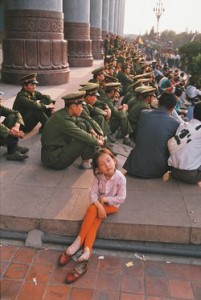Ian Johnson JUNE 5, 2014 ISSUE
The People’s Republic of Amnesia: Tiananmen Revisited
by Louisa Lim
Oxford University Press, 248 pp., $24.95
Tiananmen Exiles: Voices of the Struggle for Democracy in China
by Rowena Xiaoqing He
Palgrave Macmillan, 212 pp., $95.00; $29.00 (paper)

Ken Jarecke/Contact Press Images
Chinese troops observing the Tiananmen Square demonstration in May 1989 before the army was ordered to attack
Every spring, an old friend of mine named Xu Jue makes a trip to the Babaoshan cemetery in the western suburbs of Beijing to lay flowers on the tombs of her dead son and husband. She always plans her visit for April 5, which is the holiday of Pure Brightness, or Qingming. The traditional Chinese calendar has three festivals to honor the dead and Qingming is the most important—so important that in 2008 the government, which for decades had tried to suppress traditional religious practices, declared it a national holiday and gave people a day off to fulfill their obligations. Nowadays, Communist Party officials participate too; almost every year, they are shown on national television visiting the shrines of Communist martyrs or worshiping the mythic founder of the Chinese people, the Yellow Emperor, at a grandiose monument on the Yellow River.
But remembering can raise unpleasant questions. A few days before Xu Jue’s planned visit, two police officers come by her house to tell her that they will do her a special favor. They will escort her personally to the cemetery and help her sweep the tombs and lay the flowers. Their condition is that they won’t go on the emotive day of April 5. Instead, they’ll go a few days earlier. She knows she has no choice and accepts. Each year they cut a strange sight: an old lady arriving in a black sedan with four plainclothes police officers, who follow her to the tombstones of the dead men in her life.
Xu Jue’s son was shot dead by a soldier. Within a few weeks, her husband’s hair had turned white. Five years later he died. Qisile, she explained: angered to death. On her husband’s tombstone is a poem explaining what killed both men:
Let us offer a bouquet of fresh flowers
Eight calla lilies
Nine yellow chrysanthemums
Six white tulips
Four red roses
Eight-nine-six-four: June 4, 1989.
This is a date that the Communist Party has tried hard to expunge from public memory. On the night of June 3–4, China’s paramount ruler, Deng Xiaoping, and a group of senior leaders unleashed the People’s Liberation Army on Beijing. Ostensibly meant to clear Tiananmen Square of student protesters, it was actually a bloody show of force, a warning that the government would not tolerate outright opposition to its rule. By then, protests had spread to more than eighty cities across China, with many thousands of demonstrators calling for some sort of more open, democratic political system that would end the corruption, privilege, and brutality of Communist rule.1 The massacre in Beijing and government-led violence in many other cities were also a reminder that the Communist Party’s power grew out of the barrel of a gun. Over the coming decades the Chinese economy grew at a remarkable …
From The New York Review of Books
http://www.nybooks.com/articles/archives/2014/jun/05/ghosts-tiananmen-square/
